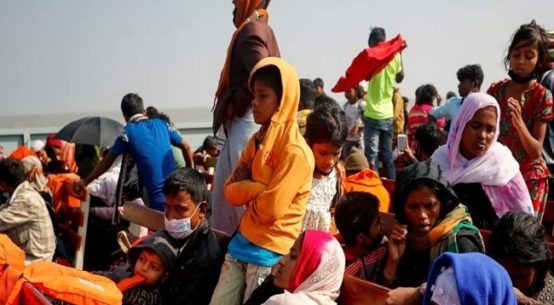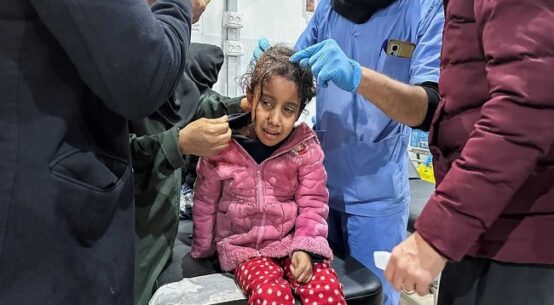
For Ukrainian gun commander Oleksandr Kozachenko, the long-awaited U.S. ammunition can’t come fast enough as he and his comrades struggle to hold off relentless Russian attacks.
His unit’s U.S.-supplied M777 howitzer, which once hurled 100 shells a day at the encroaching enemy, is now often reduced to fewer than 10.
“It’s a luxury if we can fire 30 shells.”
America says it’s rushing ammunition and weapons to Ukraine following the delayed approval of a $61 billion aid package by Congress last month. As of early May, though, two artillery units visited by Reuters on the eastern frontline said they were still waiting for a boost in deliveries and operating at a fraction of the rate they need to hold back the Russians.
Gunners with Kozachenko’s 148th Separate Artillery Brigade and the 43rd Artillery Brigade, both in the Donetsk region, said they were desperate for more 155mm rounds for their Western cannons, which had given them an edge over Russia earlier in the war.
Resurgent Russian forces, which significantly outnumber and outgun the Ukrainian defenders, have been mounting multiple attacks across the eastern Donbas region in recent months and along the country’s northeastern border last week.
The drive has marked an inflection point in the conflict spawned by Russia’s full-scale invasion more than two years ago.
Russia has gained more territory in 2024 than it lost control of during Ukraine’s much-hyped counteroffensive in the summer of 2023, according to Pasi Paroinen, an analyst with Black Bird Group, a Finnish-based volunteer group that analyses satellite imagery and social media content from the war.
Moscow’s forces have claimed 654 sq km since the beginning of this year, outstripping the 414 sq km lost to Ukraine between June 1 and Oct. 1 last year, Paroinen said. Russia has gained 222 sq km of territory since only May 2, he added.
Russia’s defence ministry didn’t respond to a request for comment for this article, while Ukraine’s military didn’t immediately respond.
Colonel Pavlo Palisa, whose 93rd Mechanised Brigade is fighting near the key strategic city of Chasiv Yar, said he believed Russia was preparing a major push to break Ukrainian lines in the east. This echoed the commander of Ukraine’s ground forces who said last week he expected the war to enter a critical phase over the next two months as Moscow tries to exploit persistent delays in weapons supplies to Kyiv.
“Without a doubt, this will be a difficult period for the armed forces,” said Palisa, adding that he believes the Kremlin wants to capture the entire Donbas industrial region by the end of this year.
Russian forces are gradually making inroads that could come to threaten several big cities in the east including Kostiantynivka, Druzhkivka, Kramatorsk and Sloviansk, which serve as key military hubs for Kyiv’s war effort.
Some gains are striking fear in the heart of the hundreds of thousands of Ukrainians living in those Donetsk region cities as the enemy grinds ever closer.
“We live only for today,” said 31-year-old school teacher Nina Shyshymarieva, standing with her young daughter outside a church in Kostiantynivka as artillery thundered in the distance.
“We don’t know what will happen tomorrow.”
Russian cannons are now easily within range of Kostiantynivka; the closest Russian position at the start of 2024 was about 20 km away, according to open-source maps that show shifting positions along the frontline. Now it is 14 km.
Shyshymarieva and the fighters on the frontline were among more than a dozen soldiers, commanders, residents and evacuation volunteers interviewed by Reuters in eastern Ukraine over the last two weeks. They painted a picture of deep uncertainty.
Much of the Donetsk region, which along with Luhansk makes up the greater Donbas area, is under daily bombardment, typically targeted at least a dozen times a day by Russian artillery or air strikes, according to regional governor Vadym Filashkin.
Ruins of homes, apartment blocks and administrative buildings are common sights in towns and cities.
Oleksandr Stasenko, a volunteer rescuer, said his team was receiving more evacuation requests particularly from Kostiantynivka and Kurakhove, another town further south, among other settlements.
Russian forces have encroached toward Kurakhove, too, advancing 2-3 km along the road running east from the town so far this year.
“Wherever the front line is approaching, people in those places are trying to leave as soon as possible,” said Stasenko, adding that his group, East SOS, evacuates around two dozen a week, many of them elderly or infirm.


